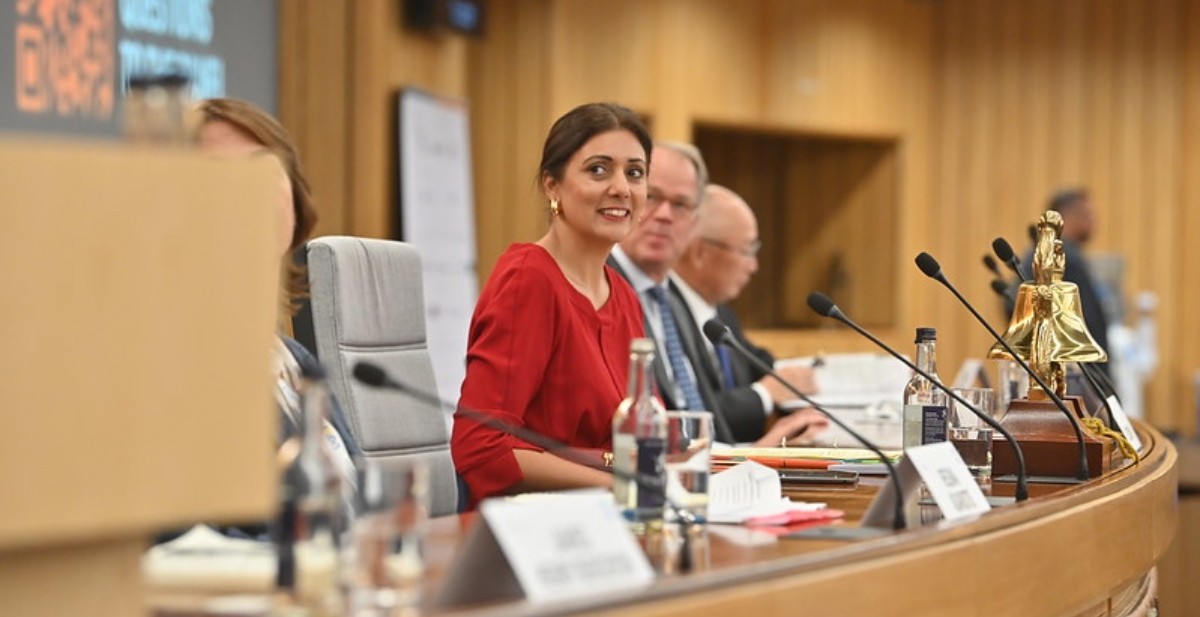Pulling the trigger on shipping’s security concerns

London International Shipping Week panel warning of a new weapons suite to disrupt trade
By Carly Fields
The post-Cold War era of maritime security is over, and the industry must adapt or risk being swept away by a tide of new threats and shifting power dynamics – that was the message from a London International Shipping Week panel from last week’s headline conference.
Moderator and deputy speaker of the House of Commons, Nusrat Ghani MP, opened the panel with a warning that the "post war consensus that enabled decades of open trade is now under pressure”, and "multilateral institutions are being tested”.
She underscored the critical link between trade, diplomacy, and geopolitical strategy, stating, "you need to pay attention to what ships are carrying, what they're charging, and where they're going”. Ghani noted that while the shipping industry is familiar with the concept of freedom of navigation, this principle is "not always understood by the rest of industry, journalists or by politicians”. Highlighting the stakes, she pointed to flashpoints from the Red Sea to the South China Sea, where "great powers are being tested".
Panellist James Henry Bergeron, political advisor to the Commander of NATO Allied Maritime Command, corroborated Ghani’s view, noting that
"there has been a paradigm shift in the nature of maritime security in the last four years”.
He explained that for much of the post-Cold War era, the focus was on threats from non-state actors like pirates or smugglers. This all changed on February 24, 2022, with Russia's full-scale invasion of Ukraine, which "directly targeted" shipping and ports. This was followed by the Houthi campaign in the Red Sea, which has "successfully diverted 65% of East West trade around Africa" using technology and weapons provided by others, he said..
Bergeron described this as the "second revolution in military affairs”, a complete inversion of the first. Where the first was about "exquisite, expensive technology in the hands of a few rich countries”, this new era sees "precision strike in the hands of just about anybody who wants it”. This new reality, he argued, has created a "technical dilemma" for navies, which are struggling to respond. He also warned of the vulnerability of the last "guaranteed" safe route around Africa, suggesting that it "wouldn't be that hard" for bad actors to disrupt it, drawing an analogy to the low-tech success of Somali pirates. This weaponisation of interdependence is on steroids with the rise of emerging, disruptive technologies, particularly autonomy, creating a new "weapons suite for those who would like to disrupt trade”.
Industry adaptability
The shipping industry's response to this volatility has been a blend of challenge and unexpected opportunity. Also on the panel, Takeshi Hashimoto, CEO of Mitsui O.S.K. Lines (MOL), spoke about the necessity of adaptability and flexibility. He acknowledged that the rerouting of vessels around the Cape of Good Hope due to the Red Sea crisis, while increasing costs, also "created some new shipping opportunities”. To navigate this new environment, MOL has focused on "strengthening its internal intelligence”, increasing staff in key global hubs like London, Washington, and Singapore to gather information and enhance resilience. Hashimoto noted that the company is also "trying to diversify our business" to mitigate risks, finding a balance between difficult situations and business opportunities.
Echoing the theme of collaboration, Nikolaus H Schües, CEO of Reederei F. Laeisz and immediate past president of BIMCO, said that the overruling aim for both governments and the industry is to ensure "a safe passage at sea and secure ships and their crew and free navigation there”.
He highlighted the alignment of interests:
"Ship owners usually go to the office to try to earn money, and governments usually go to the office to try to be re-elected. And both works much better if you have a rule-based and a peaceful environment."
Schües praised the growing collaboration between the two, noting that his takeaway from an earlier address was that "the challenges that we are facing are bringing us closer together."
Regulatory landscape
Beyond geopolitics, the industry faces a tangle of regulatory pressures. Ghani highlighted the EU's new carbon border tax adjustment mechanism, which will place tariffs on high-carbon imports, impacting maritime shipping vessels and pushing companies toward cleaner fuels. This has led to a "surge in investments in alternative fuel technologies, including green ammonia, ammonia and LNG”. She also touched on the broader push for decarbonisation, noting the IMO's ambition to reduce emissions by 40% by 2030, which will impact costs not only for shipping but for the global economy.
Amid these challenges, a more insidious threat lurks: fraudulent ship registration. Regina Asariotis, chief, (a.i.) of the Trade Logistics Branch at UNCTAD, described this as an issue of "growing global concern" that threatens maritime safety, security, and the marine environment.
She explained that fraudulent registries make it impossible to know who is who, hindering the effective implementation of rules.
While a full international convention has not been adopted, she noted that the IMO Legal Committee has made progress, including a General Assembly resolution and ongoing work on voluntary guidelines for ship registration.
Despite the issues, Ghani concluded that it not just about identifying challenges for shipping, “it's about exploring how shipping can lead through uncertainty, rebuild trust and reinforce the value of interconnected economies”.